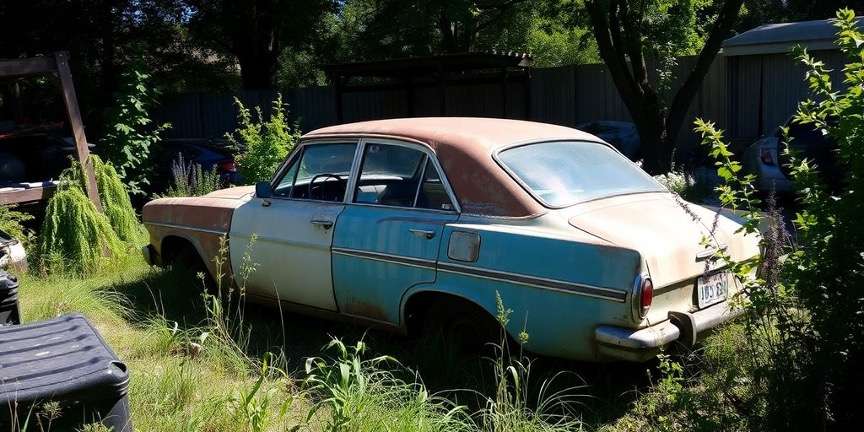Key Takeaways
- Understand the legal definition of an abandoned vehicle to avoid any legal mishaps.
- Follow the right steps to claim ownership before selling an abandoned car.
- Explore different selling options like auctions or scrap yards, based on your situation.
- State laws vary, so check local regulations or consult with a legal expert.
- Prevent future issues by having a clear policy for handling abandoned vehicles.
Understanding the Legal Definition of an Abandoned Vehicle

What Constitutes a Vehicle as Abandoned?
When it comes to figuring out if a car is truly abandoned, it's not always as simple as it seems. Legally, a vehicle is considered abandoned if it's been left unattended on someone else's property without permission for a certain period, which varies depending on local laws. Typically, if a car's been sitting around for a couple of weeks without any signs of the owner, it might be tagged as abandoned. But hey, don't just take my word for it—always check with your local rules to be sure.
Legal Implications of Abandoned Vehicles
Abandoned vehicles can be more than just an eyesore; they can lead to legal headaches. For property owners, dealing with these vehicles might mean having to go through the legal system to either remove or claim them. This can involve notifying the authorities, possibly waiting for a public auction, or even dealing with the original owner if they pop up. It's not just about getting rid of a car; it's about doing it the right way so you don't end up in hot water.
Difference Between Abandoned and Stolen Vehicles
It’s easy to confuse an abandoned car with a stolen one, especially if it looks like it's been left in a hurry. The key difference is ownership and intent. An abandoned car is usually one that the owner has willingly left behind, often due to disrepair or neglect. A stolen vehicle, on the other hand, is taken without the owner's consent and can end up abandoned if the thief decides to ditch it. If you suspect a car is stolen, it's best to report it to the authorities right away. They can check if it's listed as stolen and handle it from there.
Understanding the ins and outs of abandoned vehicle laws can save you a lot of hassle. Always remember, what seems like a simple junk car might have a whole lot of legal strings attached.
Steps to Legally Claim Ownership of an Abandoned Car
Gathering Necessary Documentation
Before you even think about claiming ownership of an abandoned car, you need to gather all the paperwork. It's like prepping for a big project—you don't want to be caught without the right tools. Create a folder that includes everything about the car: any service contracts, dates of when the car showed up, repairs made, and the owner's contact info if you have it. Don't forget the VIN—it's like the car's fingerprint. Being organized can really save you from a headache later on.
Contacting Local Authorities
Once you've got your documents in order, it's time to start making some calls. You'll need to contact local government offices to understand the rules you need to follow. Start with your city or township, then move to the county, and finally the state DMV. It's a bit of a hassle, but it's necessary. You might need to leave some voicemails, but keep at it. Persistence is key here. Explain your situation clearly and ask what you need to do to take ownership of the abandoned vehicle.
Filing the Required Paperwork
Now comes the part where you dive into the paperwork. Depending on where you live, the steps can vary, but generally, you might need to send a certified letter to the car's owner, file paperwork to get a lien on the vehicle, and maybe even publish a notice in the local paper. It's not just about filling out forms; it's about making sure you follow every step to the letter. You might even have to wait for some time before you can officially claim the car. Remember, patience is your friend here.
Taking ownership of an abandoned car isn't just about filling out a few forms. It's a process that demands attention to detail and patience. But once you get through it, you'll have the legal right to do what you want with the car, whether that's selling it or using it for parts.
Exploring Your Options for Selling a Junk Car
Selling Through a Public Auction
If you're thinking about selling a junk car, one popular option is through a public auction. This method is often required by law in many states, especially if the car was abandoned. Public auctions are a way to ensure that the sale process is fair and transparent. To get started, you'll need to check your local laws to see if auctioning is a requirement. Once you have the green light, you'll typically need to:
- Notify the previous owner: Before the auction, you must send a certified letter to the last known owner, informing them of the sale.
- Advertise the auction: Most areas require you to publish a notice of the auction in a local newspaper.
- Conduct the auction: On the day of the auction, ensure all legal procedures are followed to avoid future disputes.
Obtaining a Title for the Vehicle
Getting a title for an abandoned vehicle is often necessary before selling. Without a title, transferring ownership can be tricky. In some places, you may need to file for a new title through your state's DMV. This process typically involves:
- Filing necessary paperwork: You'll need to submit forms that prove you have the right to claim the vehicle.
- Paying any fees: There might be fees associated with obtaining the title, so budget accordingly.
- Waiting for approval: The DMV will review your application, and this can take some time.
Working with a Scrap Yard
If the car is beyond repair, selling it to a scrap yard could be your best bet. Scrap yards buy junk cars for their metal, and while you won't get top dollar, it's a quick way to dispose of the vehicle. Here's how to go about it:
- Contact local scrap yards: Get quotes from several places to ensure you're getting a fair price.
- Arrange for towing: Many scrap yards offer free towing, so ask if this service is available.
- Transfer any remaining paperwork: Even if the car is being scrapped, you'll need to ensure all legal documents are properly handled.
Selling a junk car, especially one that's been abandoned, involves navigating a maze of legal requirements. But with the right approach, you can turn this seemingly worthless vehicle into a small profit or at least clear up some space on your property.
Navigating State-Specific Laws on Abandoned Vehicles
Understanding State Regulations
Dealing with abandoned vehicles isn't just a one-size-fits-all process. Each state has its own set of rules, and these can vary quite a bit. Some states might require you to wait a certain number of days before a vehicle is officially considered abandoned, while others might have specific ways you need to notify the previous owner. It's crucial to get familiar with these regulations to avoid any legal headaches.
- Check with Local Authorities: Always start by contacting local authorities to understand the specific steps required in your area.
- State-Specific Guidelines: Look up the guidelines provided by your state's Department of Motor Vehicles (DMV) or equivalent agency.
- Stay Updated: Laws change, so make sure you're working with the most current information.
Consulting with Legal Experts
Sometimes, the legal jargon can be overwhelming. This is where consulting with a legal expert can save you from potential pitfalls. A lawyer who knows about property and vehicle laws can offer valuable advice on how to proceed. They can help you interpret the laws specific to your state and ensure you’re following the correct procedures.
Common Legal Pitfalls to Avoid
When dealing with abandoned vehicles, there are several common mistakes people make:
- Ignoring Local Laws: Don’t assume that state laws cover everything. Sometimes, county or city regulations come into play.
- Skipping Notifications: Failing to properly notify the vehicle owner can result in legal challenges.
- Improper Disposal: Selling or disposing of a vehicle without following the right steps can land you in trouble.
Remember, understanding the laws specific to your state can make a huge difference in how smoothly the process goes. Take the time to research and consult with professionals if needed to avoid unnecessary complications.
Preventing Future Abandoned Vehicle Issues

Creating an Abandoned Vehicle Policy
Having a clear policy in place can save you a ton of headaches. Drafting a simple checklist for dealing with abandoned vehicles is a smart move. It should outline the steps you need to take when a vehicle gets left behind. Include things like how to contact the owner, deadlines for paperwork, and any legal notices you need to send. Keep a few copies of the necessary forms handy, so you're not scrambling when the situation arises.
Working with Law Enforcement
It's always a good idea to have a relationship with your local law enforcement. They can provide guidance on the legal steps you need to follow. Plus, they can help if things get tricky. Regular communication with them ensures you're up-to-date on any changes in the law. And let's be honest, having a cop on your side never hurts.
Educating Property Owners
Sometimes, the best way to prevent problems is to educate those around you. Talk to property owners about the issues abandoned vehicles can cause and how they can help prevent them. Share information about the legal process and encourage them to report vehicles that seem to be left behind. Knowledge is a powerful tool in stopping these problems before they start.
Being prepared with a solid plan and good relationships can make the difference between a smooth resolution and a long, drawn-out process. Stay informed and proactive to keep abandoned vehicle issues at bay.
Financial Considerations When Dealing with Abandoned Cars
Dealing with abandoned cars isn't just about the legal stuff; it can hit your wallet too. Here's a look at what you might face financially.
Costs Involved in Legal Processes
Handling an abandoned vehicle can come with a bunch of costs. First off, there's the paperwork. Filing fees might not break the bank, but they add up. Then, if you need legal advice, attorney fees can be steep. Plus, if you're storing the car, storage facilities might charge you for keeping it there. If the car's left unclaimed, it could be sold or transferred, but until then, those fees are your responsibility.
Potential Profits from Selling
Once you clear the legal hurdles, selling a junk car can bring in some cash. Selling it to a scrap yard is a straightforward option. They pay you based on the car's weight and metal content. Alternatively, if the car's in better shape, you might sell it at auction or to a private buyer, potentially fetching a higher price. The key is knowing the car's value and choosing the right selling method.
Tax Implications of Selling
Selling an abandoned car can have tax consequences. Depending on how much you make, you might need to report the income. If you sell it for more than its value, you could face capital gains tax. It's wise to keep track of all related expenses, as they might offset any taxable income.
Remember, dealing with abandoned cars isn't just about getting rid of a nuisance. It's also about managing the financial aspects smartly so you don't end up in the red.
Conclusion
Dealing with an abandoned junk car on your property can be a real headache. It's not just about getting rid of an eyesore; it's about navigating the legal maze that comes with it. Before you make any moves, it's crucial to understand your local laws and regulations. Some places might let you sell the car after a certain period, while others have strict procedures you need to follow. Always check with local authorities to ensure you're on the right side of the law. In the end, while it might seem like a hassle, taking the proper steps can save you from potential legal troubles down the road. So, take a deep breath, do your homework, and handle the situation with care. It's better to be safe than sorry.
Frequently Asked Questions
What should I do if I find a car abandoned on my property?
If you find a car abandoned on your property, contact local authorities to report it. They can guide you through the legal process of handling or removing it.
Can I sell a car that's been abandoned on my land?
You can sell an abandoned car, but you must first follow legal steps to claim ownership. This often involves contacting authorities and filing paperwork.
How do I know if a car is legally abandoned?
A car is usually considered abandoned if it is left on private property without permission for a certain period. Check local laws for specific timeframes and conditions.
What are the risks of removing an abandoned car myself?
Removing a car without proper legal steps can lead to penalties. It's important to follow the law to avoid any legal issues.
Do I need a title to sell an abandoned car?
Yes, obtaining a title is typically required to sell an abandoned car legally. This ensures that you are recognized as the legal owner.
Who pays for the removal of an abandoned car?
The cost of removal often falls on the property owner, but some local programs might offer assistance. Check with local authorities for options.



